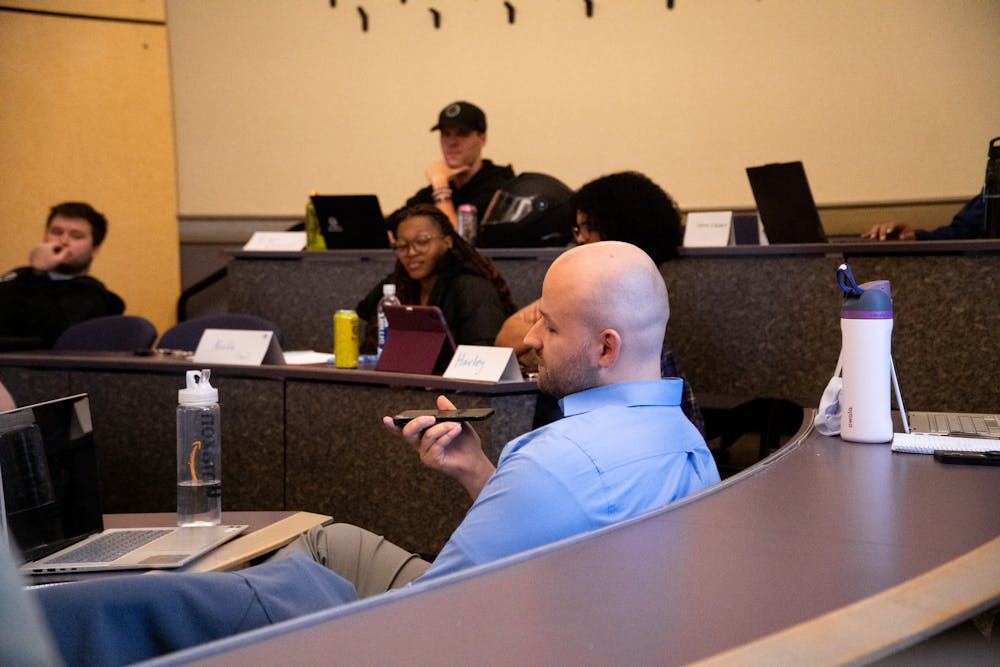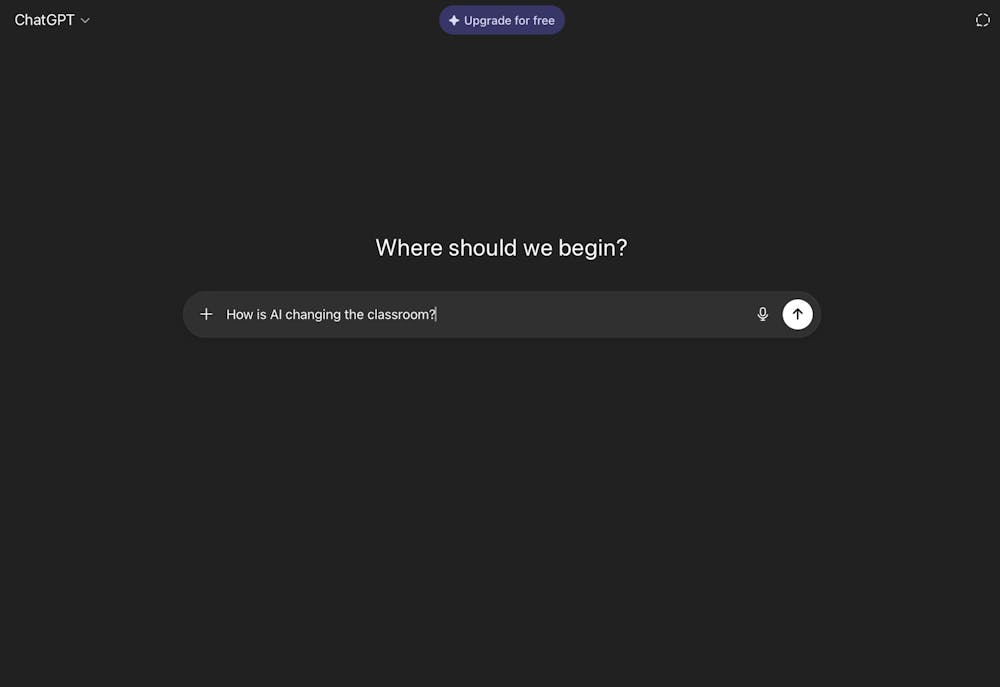From the grocery store to the research lab, artificial intelligence (AI) has found its place everywhere, including in the classroom.
Through individualized study guides, essay editing and more, students of all ages are turning to AI to help with school. Even teachers have found AI useful for things like lesson planning and expediting grading.
As AI changes the academic landscape, UP professors are learning to navigate the technology to either encourage or discourage student use.
To combat students using AI for his classes, political science professor Jeffrey Meiser has reverted to mostly in-class work.
For his courses, Meiser assigns quizzes that students will then incorporate into their final paper. While students could use AI for the final assignment, he hopes that breaking the assignment down will discourage students from engaging with the technology.
Although he describes himself as an “anti-AI extremist,” Meiser understands that the technology’s convenience invites usage.
He also says students worry about being qualified for an oversaturated job market that prioritizes AI usage in most fields.
“I am sympathetic because I think there's pressure on students as they're entering the workforce to know how to use AI,” Meiser said. “I think there ought to be offerings at UP for students to gain that knowledge. But I just don't like any hints that as regular professors in our disciplines, we need to have students incorporate AI in our courses. I'm not interested in that. I'm not going to do that.”
The university, however, is encouraging professors in all disciplines to use AI in the classroom. Funded by the Dundon-Berchtold Institute for Applied Ethics and Moral Formation, the new ethical AI initiative asks faculty to create a course that engages with AI.
Dean of the College of Arts and Sciences Valerie Banschbach spearheaded the initiative with the hopes of preparing students for the workforce and ensuring the ethical use of AI.
“I'm worried about what happens to any technology if it isn't shaped by people who care about the common good,” Banschbach said. “It can be used in ways that are discriminatory and are disadvantageous to people who are not the ones who own the technology.”

A student speaks with an AI assistant as Associate Vice President for Student Affairs and Dean of Students Colin Stewart gives a demo of Voiceflow AI, which allows users to customize their own AI agents.
And some professors support the initiative.
In his own classes, biology professor and Director for the Center for Teaching and Learning Terry Favero has moved away from textbooks. Instead, he begins each unit with students asking AI for an overview of the topic. Favero also encourages his students to utilize AI as a studying tool by asking it for practice questions in the same format as his tests.
He also invites professors to reflect on how AI can improve student engagement. While professors won’t learn about their own disciplines from chatbots, Favero believes they can learn to improve their teaching strategies.
“The question isn’t, ‘Is AI better than you?’ The question is, ‘[Are] you and AI better than just you?’” Favero said.
Similarly, when beginning a new module, political science professor Bill Curtis has students look up the topic using AI. Curtis wants his students to go down a “rabbit hole” of information by asking the chatbot questions and critically engaging with its responses.
While Curtis approves of AI as a research tool, he discourages using AI as a writing tool. To prevent this use, he has moved away from the traditional essay and shifted towards in-class exams.
“In-class, written exams are the way to make sure the students are doing the thinking themselves, rather than AI doing the thinking for them,” Curtis said.
Molly Hiro, an English professor, also worries about students using AI for writing. However, instead of moving away from the traditional essay, she’s focused on altering the environment that she believes causes students to use AI.
To do this, Hiro places an emphasis on revised work. Throughout the semester, she has students submit multiple drafts of each paper they write for her class. She’s also moved away from giving out letter grades in hopes of removing the pressure to create a perfect draft.
“[I’ve tried] to create a writing context, in which there's really nothing to be lost in taking risks and a lot to be gained from doing your own writing,” Hiro said.
In his classes, Eric Anctil, professor of media and technology, regularly engages with AI, often by having chatbots lead class discussions. In fact, Anctil begins his semesters not by going over a syllabus or discussing class expectations, but by introducing the class to ChatGPT.
“I talk about how this is going to be the future, and it’s imperative that you learn how to communicate with these things and work with them,” Anctil said. “Because the difference will be, there are people who will engage with these things if you decide not to, and you will be at their mercy if you don't.”
For Anctil, the incorporation of AI into academia and the workplace is inevitable.
“[AI]’s being imposed upon us, and we have to figure out how to work with it in the same way that people had to figure out how to use cell phones, in the same way that people had to use the internet,” Anctil said. “It's just that next thing.”
Jon Down, professor of entrepreneurship and AI, has been tracking AI advancements for over 10 years. He’s reached a similar conclusion to Anctil: AI isn’t going away.
Despite his reservations about the technology’s rapid development, he views not incorporating it into his courses as a disservice to his students.
“If I could push a button and stop all of it, I would 100% do that,” Down said. “But right now, that’s not happening. So we have to move forward.”

A laptop sits on a desk with Zapier AI open on the screen. Stewart gave a demo of various artificial intelligence applications on Oct. 1.
In class, Down uses AI to create class activities. For example, he will have AI create a multiple choice quiz and then go over the quiz with his students. This way, students can engage in conversations, debating on what the right answer might be.
Additionally, Down has stopped emphasizing grades on assignments he knows students could use AI to complete. Instead, he values engagement in class.
“If you as a student are able to engage in the class, and I, as the faculty member, [am] able to create the opportunity for you to engage and if you do [engage] and you feel like you're learning you're gonna get a good grade,” Down said. “You know, it’s not gonna be because you did homework assignments really well, because we know AI can do that.”
Bailey Kwon, a senior biology major, uses AI as a studying tool. She finds it helpful to give the chatbot her notes and class information to create practice tests and study guides.
Additionally, Kwon is in Curtis’ class and uses AI for her assignments as per his instruction. While she doesn’t particularly enjoy those assignments, Kwon thinks it’s necessary for professors to engage with AI in some capacity.
“I think AI is, unfortunately, only going to go up from here,” Kwon said. “So I think it's great that, in a way, [professors] are implementing that into our courses, so that we're prepared for it in the future.”
On the other hand, junior psychology major Monae Cuellar refuses to use AI, believing AI is a disservice to her learning.
“I'd rather take accountability for not knowing something versus giving my struggles to AI and letting it do the work,” Cuellar said. “Sometimes, it’s better to take the hit and learn from your mistakes if you actually want to feel good about the work you do and how you can improve.”
In spite of her dislike for AI, Cuellar agrees that UP should have spaces where it is taught. For her, a classroom is a great place to engage with the technology, while still acknowledging the harms and consequences that come from embracing it.
“Yes, times are changing and yes, we should embrace change, but not at the cost of the human experience of learning and creating with our own hands, as imperfect as it can be,” Cuellar said.
Samantha Zavala is the Diversity, Equity and Inclusion Editor for The Beacon. She can be reached at zavala27@up.edu








